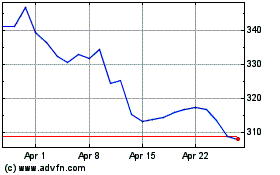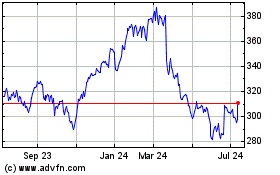By Jean Eaglesham and Kirsten Grind
State governments struggling with the coronavirus pandemic have
paid tens of millions of dollars to big consulting firms for
help.
The consultants promised to help the states tackle a range of
problems, including delivering medical equipment and staffing call
centers that handle worker benefits. In some cases, states have
seen only modest benefits, if any at all, for the extra cost, The
Wall Street Journal found through interviews and public-records
requests.
Two major consulting firms, McKinsey & Co. and Deloitte
Consulting LLP, together have won coronavirus-related contracts
worth at least $182 million from states, more than double their
tally of federal coronavirus contracts, according to a Journal
analysis of public records and news releases.
The full amount of money received by the firms is likely even
higher -- comprehensive data on states' spending isn't yet
available.
"They're seeing this massive economic opportunity arising from a
grave public health problem and they're stepping in to take
advantage," said Caroline Buckee, an associate professor of
epidemiology at Harvard University's T.H. Chan School of Public
Health.
Consulting firms say they are responding to state governments'
requests for help. Boston Consulting Group, for example, said that
when the pandemic hit, the firm "rapidly mobilized substantial
expertise and resources to help states manage the crisis."
States have been largely left alone by the federal government to
tackle the pandemic and related issues. Their continuing struggles
to enlist consultants to help them -- at a high price to taxpayers
-- shows how challenging that autonomy has been.
"When you're trying to secure a global supply chain, that's not
something a state emergency department normally deals with," said
Jeffrey Stern, who led Virginia's department of emergency
management until June.
California turned to Deloitte to help handle a flood of claims
engulfing its antiquated benefits system -- a system Deloitte has
billed the state millions for over the years, part of more than
$250 million of work for the employment department. This spring,
the firm was awarded a new $5 million contract to help upgrade
systems to pay pandemic benefits. Deloitte also won an $11.1
million, two-month contract to supply call-center staff to quickly
increase the employment department's capacity. In August, the state
increased the contract to $42.6 million.
It didn't fix either problem. The department's two call centers
-- including one partly staffed by Deloitte -- are overwhelmed, an
official state report in September found. And a huge backlog of
unresolved claims, tallying more than a million, was growing by at
least 10,000 every day, the report said.
Jamie Anderson, a 25-year-old single mom and former call-center
worker in Palmdale, Calif., near Los Angeles, said she has spent
hundreds of hours on the phone with the employment department since
losing her job in April. She said she had to wait until September
to get thousands of dollars of benefits she was owed. "I called and
called for weeks and all they did was put me on the call-back
list," she said. "I have no income, I have a child, and I live in a
small city where all the jobs are taken."
Deloitte clearly has "not successfully resolved [the
department's] IT challenges or modernized its system," a letter
from dozens of local lawmakers this year said. David Chiu, a
Democratic member of the state's Assembly, said it is "incredibly
concerning that [the employment department] has continued to go
back to a contractor that has a well-documented history of bungling
unemployment insurance work, not just for California but for other
states."
A Deloitte spokesman said the firm has been "proud to help stand
up, scale and support," state and federal support programs during
the pandemic. The spokesman referenced a September response to
California lawmakers, which said there had been a solid improvement
in the numbers of claimants paid over the past few months.
A spokeswoman for California's employment development department
said it has processed more than 15.2 million claims so far during
the pandemic -- far more than the 3.8 million during 2010, the year
with the highest number of claims during the previous
recession.
New York Gov. Andrew Cuomo's office awarded McKinsey a $9.9
million contract in March to advise the state on issues related to
Covid-19, the illness caused by the new coronavirus. That included
18 weeks of "leadership counseling" at $42,500 a week -- the
contract didn't specify who would be counseled, or what that would
entail.
The work was later reduced to seven weeks at $27,000 a week, as
part of a cost-cutting effort that saw the overall fee
approximately halved, according to a response to a public-records
request. Representatives for Mr. Cuomo didn't respond to requests
for comment.
McKinsey also did work for Massachusetts, some of which appeared
to involve little more than forwarding others' material along.
Researchers at Harvard University prepared reports for the state's
health department tracking population movements. Consultants at
McKinsey used the reports verbatim in material for the governor,
according to a person familiar with the work.
While the researchers were grateful the governor received the
data, they were puzzled why the paid consultants were needed to
share data among state officials, this person said. The office of
Gov. Charlie Baker didn't return a request for comment.
A McKinsey spokesman declined to respond to specific questions
and pointed to its website, where the firm details its Covid-19
work across the U.S. The company says it is supporting leaders and
public servants "with management and organizational expertise, and
analytical capabilities to help inform their decisions."
Consulting firms have been hit hard by a loss of work from
corporate clients because of the pandemic.
For coronavirus work, Deloitte offered a discount on its usual
rates -- 15% on a contract with Ohio, for example -- while McKinsey
in the spring introduced reduced philanthropic fees, according to
contracts.
The costs still appear to be high. Illinois and California are
paying Deloitte $55 an hour -- more than $100,000 a year on a
full-time basis -- for agents doing basic call-center work. That is
more than double what the states pay agents they hire directly to
do similar work, according to copies of the contracts and recent
job advertisements. Permanent staff enjoy benefits. But the
Deloitte rate is higher than at least one other contract for
pandemic call-center work: Nevada is paying call-center operator
Alorica Inc. $33.50 an hour for its agents, the contract shows.
A spokeswoman for Illinois said the Deloitte rate was negotiated
downward to $55 an hour, adding that "the priority was increasing
capacity as quickly as possible."
In Massachusetts, Gov. Baker said in April that the state would
hire Accenture PLC for $28 million to track residents infected with
the virus, a process known as contact tracing.
The consultants produced their own reports, while also
attempting to incorporate a tracking system by San Francisco-based
Salesforce.com Inc. with an existing database used by state health
agencies, according to people familiar with the efforts.
The combination of the different systems initially resulted in a
mess, with some researchers and state officials concerned that
patients' personal medical data could be lost or accessed
improperly, one of these people said.
By July, the contact-tracing effort had been scaled back,
although it has since picked back up again as cases have risen in
Massachusetts, people familiar with the effort said. A spokeswoman
for the governor's office said the state has worked with McKinsey
for several months, "including in helping to develop and refine our
robust public data reporting and strategically increasing our
testing capacity."
An Accenture spokesman said in a written statement the firm was
"proud to be supporting" Massachusetts' contact-tracing effort. The
state agency in charge of contact tracing "continues to work
effectively with local health departments," a spokesman said, using
its own systems complemented by "data-management" services from
Accenture.
Lisa Schwartz and Andrea Fuller contributed to this article.
Write to Jean Eaglesham at jean.eaglesham@wsj.com and Kirsten
Grind at kirsten.grind@wsj.com
(END) Dow Jones Newswires
November 02, 2020 05:44 ET (10:44 GMT)
Copyright (c) 2020 Dow Jones & Company, Inc.
Accenture (NYSE:ACN)
Historical Stock Chart
From Mar 2024 to Apr 2024

Accenture (NYSE:ACN)
Historical Stock Chart
From Apr 2023 to Apr 2024
